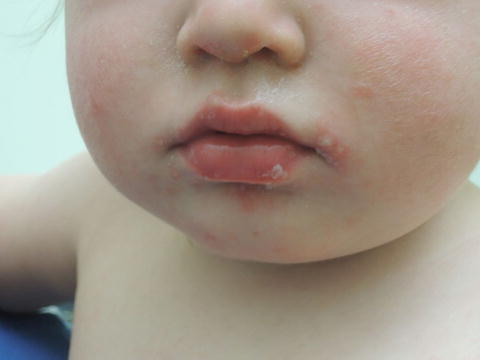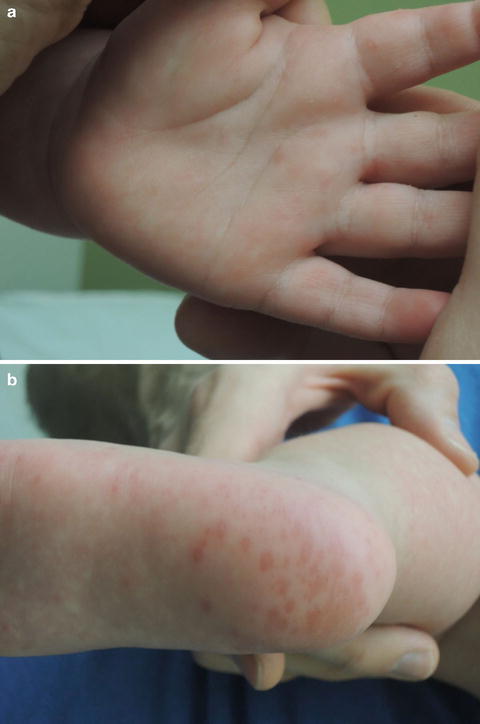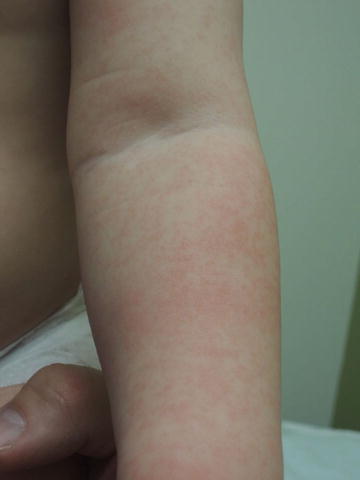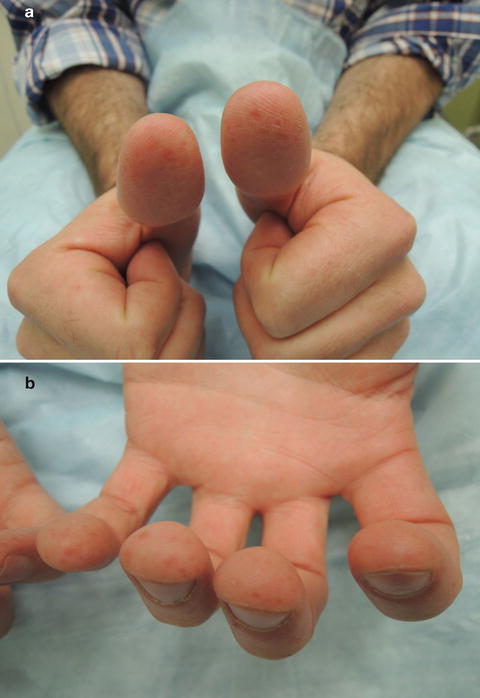, Corinna Eleni Psomadakis2 and Bobby Buka3
(1)
Department of Family Medicine, Mount Sinai School of Medicine Attending Mount Sinai Doctors/Beth Israel Medical Group-Williamsburg, Brooklyn, NY, USA
(2)
School of Medicine Imperial College London, London, UK
(3)
Department of Dermatology, Mount Sinai School of Medicine, New York, NY, USA
Keywords
Hand, foot, and mouth diseaseHFMDCoxsackieEnterovirusCoxsackievirusA6A16Enterovirus 71Fecal–oral transmissionPediatricVesiclesVirusProdromal symptomsMalaiseFeverSymptomatic reliefSelf limiting
Fig. 48.1
Gray-based ulcers with a rim of erythema on mucosal and perioral surfaces

Fig. 48.2
(a and b) Nonspecific pink papules on the palm, fingers, and soles

Fig. 48.3
Slightly scaly morbilliform pattern bilateral arms and trunk may also be present in this condition

Fig. 48.4
(a and b) Fingertips with unusual pulp distribution red brown papules
Primary Care Visit Report
Pediatric Case
A 1-year-old male with no past medical history presented with fever and rash. The fever started 4 days prior, with a maximum temperature of 103 degrees Fahrenheit. Three days prior, he developed a rash in his diaper area. Two days prior, he developed a rash on his trunk as well as a white coating, blisters and bumps in his mouth. The parents had been using topical clotrimazole on the diaper area and oral nystatin for possible thrush. He had a decreased appetite and had been cranky.
Vitals were normal except for a temperature of 99.5 degrees Fahrenheit. On exam, there were multiple ulcers around his lips and a papular rash on his face. There was an erythematous papular rash over his extremities, torso, genital region, palms, and soles, with scattered blisters on his palms and soles as well. A viral culture from the oral lesion was sent to the lab, which was negative for herpes simplex virus (HSV). The lab did not screen the culture for coxsackie .
Adult Case
A 34 year-old male with no past medical history presented with sore throat and “red spots” on his fingers. His wife had presented to the clinic earlier in the day and tested positive for strep throat with the rapid strep test, which is what prompted his visit. The patient’s symptoms started 6 days prior with chills, fatigue, and sore throat. Those symptoms lasted about 3 days and then started to resolve. Three days prior, he noticed red spots on his fingers as well as increased sensitivity of his fingertips (not painful, but bothersome if touched).
Vitals were normal. On exam, his tonsils and oropharynx were erythematous, with 1+ tonsillar edema but no exudate and no other mouth lesions . The palmar surfaces of his hands had 2 mm erythematous macules scattered on all fingers. The ventral surfaces of his feet had scattered 2 mm erythematous macules. His rapid strep test was negative, and his throat culture was negative.
Both of these cases were treated as coxsackievirus infections given the lesions on the palms and soles (and in the pediatric case , in the mouth as well) with supportive care, such as NSAIDs or acetaminophen as needed.
Discussion from Dermatology Clinic
Differential Dx
Hand–foot–mouth disease
Herpetic stomatitis
Parvovirus
Aphthous stomatitisPerniosis
Favored Dx
The prodromal syndromes and distribution of the lesions in the mouth, and on the palms and soles, are suggestive of Hand-Foot-Mouth Disease (HFMD).
Herpetic stomatitis was considered in primary care as part of the differential; however, herpetic stomatitis is rarely seen in otherwise healthy babies. Herpetic stomatitis is predominantly seen in severely immunocompromised babies, and it involves a very severe outbreak of oral lesions. Parvovirus was also considered as part of the differential. This typically presents as a distinctive, slapped-cheek facial rash in children, and joint pain in adults. There are usually no oral findings, so parvovirus would not explain the patients’ presentation in this case.
Stay updated, free articles. Join our Telegram channel

Full access? Get Clinical Tree








